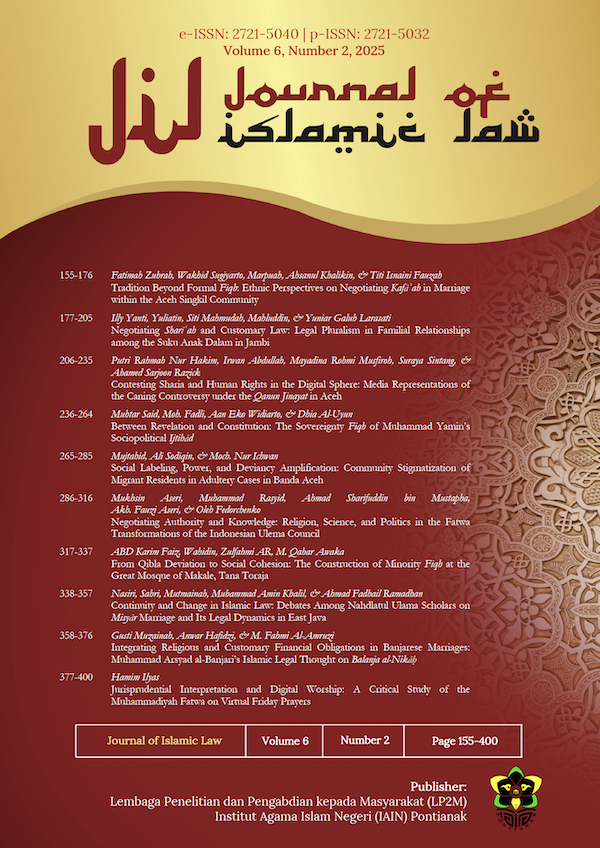Jurisprudential Interpretation and Digital Worship: A Critical Study of the Muhammadiyah Fatwa on Virtual Friday Prayers
DOI:
https://doi.org/10.24260/jil.v6i2.4413Keywords:
Fatwa, Islamic Legal Interpretation, Muhammadiyah, Text and Technology, Virtual Friday PrayerAbstract
The rapid development of digital technology has transformed not only patterns of social communication but also modes of religious practice, thereby challenging the framework of classical Islamic jurisprudence (fiqh). This article examines Muhammadiyah’s fatwa rejecting the validity of conducting Friday prayers in a virtual format during the COVID-19 pandemic, focusing on the interpretive model underpinning this legal determination. Employing a qualitative, text-based approach, the study treats the fatwa as an Islamic legal text, analyzing it in terms of its structure, argumentation, and sources of authority. Data were collected from official fatwa publications on the digital platform Suara Muhammadiyah and supplemented with relevant institutional documents. The findings reveal that Muhammadiyah employs a textual-normative interpretive model, grounded in tafsīr bi al-maʾthūr (tradition-based exegesis), which emphasizes strict adherence to the prophetic model in ritual worship (ʿibādah maḥḍah). The fatwa asserts that virtual congregations do not fulfill the physical and spatial requirements of communal prayer and that the legitimate alternative in emergencies is the performance of Ẓuhr prayer. These findings suggest that Muhammadiyah’s approach represents a careful negotiation between textual fidelity and technological adaptation, illustrating how modern fatwa-issuing institutions navigate doctrinal continuity in the face of challenges in the digital era.
[Perkembangan pesat teknologi digital telah mengubah tidak hanya pola komunikasi sosial, tetapi juga praktik keagamaan, sehingga menantang kerangka fikih klasik. Artikel ini menganalisis fatwa Muhammadiyah yang menolak keabsahan pelaksanaan salat Jumat secara virtual selama pandemi COVID-19, dengan menyoroti model interpretatif yang melandasi penetapan hukum tersebut. Melalui pendekatan kualitatif berbasis teks, penelitian ini memperlakukan fatwa sebagai teks hukum Islam yang dianalisis dari segi struktur, argumentasi, dan landasan otoritasnya. Data diperoleh dari publikasi resmi fatwa pada platform digital Suara Muhammadiyah serta berbagai dokumen kelembagaan terkait. Hasil analisis menunjukkan bahwa Muhammadiyah menerapkan model interpretasi tekstual-normatif yang berakar pada tafsīr bi al-maʾthūr, dengan penekanan pada kepatuhan ketat terhadap model kenabian dalam ranah ibadah (ʿibādah maḥḍah). Fatwa tersebut menegaskan bahwa salat Jumat secara virtual tidak dapat memenuhi syarat fisik dan spasial salat berjamaah, dan bahwa alternatif yang sah dalam kondisi darurat adalah salat zuhur. Temuan ini memperlihatkan bahwa pendekatan Muhammadiyah merepresentasikan prinsip kehati-hatian dalam menegosiasikan antara kesetiaan terhadap teks dan adaptasi terhadap teknologi, sekaligus menggambarkan bagaimana lembaga fatwa modern menegosiasikan kesinambungan doktrinal dengan tantangan kontemporer di era digital.]
References
Akmaliah, Wahyudi, and Ahmad Najib Burhani. Digital Islam in Indonesia: The Shift of Ritual and Religiosity during Covid-19. ISEAS-Yusof Ishak Institute, 2021. https://www.iseas.edu.sg/articles-commentaries/iseas-perspective/2021-107-digital-islam-in-indonesia-the-shift-of-ritual-and-religiosity-during-covid-19-by-wahyudi-akmaliah-and-ahmad-najib-burhani/.
Al-Baghawiy, Al-Husain bin Masúd. Ma’alim al-Tanzil. I. Riyad: Dar al-Taybah, n.d.
Al-Bāqillānī, Abū Bakr Muḥammad ibn al-Ṭayyib. Al-Taqrīb wa al-Irsyād (al-Ṣaghīr). I. Beirut: Al-Risālah, 1988.
Ali, Abdelhalim Mohamed Mansour, and Muhammad Ahmad Ibrahim Aljahsh. “The Proliferation of Anomalous Digital Fatwas: A Critical Examination of Jurisprudential Challenges and Societal Impacts in the Digital Age.” Ahkam: Jurnal Ilmu Syariah 25, no. 1 (2025): 37–52. https://doi.org/10.15408/ajis.v25i1.37905.
Ali Sati, Abdul Halim, Abdul Hayy Nasution, and Muhammad Ridwan. “The Digital Transformation of Tafsir and Its Implications for Islamic Legal Derivation in the Contemporary Era.” MILRev: Metro Islamic Law Review 4, no. 1 (June 2025): 389–415. https://doi.org/10.32332/milrev.v4i1.10425.
Al-Jailānī, ’Abdul Qādir. Tafsir al-Jailānī. Vol. 1. Kairo: Dār al-Rukni wa al-Maqām, 2009.
Al-Jazīrī, Abd al-Rahmān. Al-Fiqh ʿala al-Madhāhib al-Arbaʿah. Beirut: Dar al-Kutub al-‘Ilmiyyah, 2008.
Al-Juwaynī, Imām al-Ḥaramayn. Al-Talkhīṣ fī Uṣūl al-Fiqh. I. Dār al-Basyā’ir al-Islāmiyyah, n.d.
Al-Māwardī. Al-Nukat wa al-‘Uyūn. I. Beirut: Dār al-Kutub al-‘Ilmiyyah, 1992.
Al-Nawawī, Abū Zakariyyā Yaḥyā ibn Sharaf. Al-Majmū‘ Sharḥ al-Muhadhdhab. Vol. 4. Beirut: Maktabat al-Irshād, 2006.
Al-Qurṭubī, Ibn Rusyd. Al-Bayān wa al-Taḥṣīl. IV. Beirut: Dār al-‘Arab al-Islāmī, 1988.
Al-Siba‘i, Mustafa. Al-Sunnah wa Makānatuha fī al-Tashrī‘ al-Islāmī. Egypt: Al-Dār al-Qawmiyyah, 1966.
Al-Zamakhsharī, Abū Al-Qasim ibn Muhammad ibn Umar. Al-Kashshāf ‘an Ḥaqā’iq al-Tanzīl wa ‘Uyūn al-Aqāwīl fī Wujūh al-Ta’wīl. II. Intisyarat Afab, n.d.
Al-Zuḥailī, Wahbah. Uṣūl al-Fiqh al-Islāmī. Vol. 1. Damaskus: Dār al-Fikr, 1986.
Anderson, J. W. “New Media in the Muslim World: The Emerging Public Sphere.” Isim Newsletter (Netherland), 2000. 5(1) Edition.
Ash-Shiddieqy, Hasbi. Sejarah dan Pengantar Ilmu Hadis. Jakarta: Bulan Bintang, 1974.
Bambang. “Ijtihad and the Dynamics of Islamic Legal Interpretation: An Epistemological Exploration in the Contemporary Context.” NUSANTARA: Journal of Law Studies 3, no. 1 (July 2024): 56–67. https://doi.org/10.5281/zenodo.17373912.
Burge, S.R. “Scattered Pearls: Exploring al-Suyūtī’s Hermeneutics and Use of Sources in al-Durr al-Manthūr fī’l-Tafsīr bi’l-Maʾthūr.” Journal of the Royal Asiatic Society 24, no. 2 (2014): 251–96. https://doi.org/10.1017/S1356186313000795.
Divisi Fatwa Majelis Tarjih dan Tajdid and Pimpinan Pusat Muhammadiyah. Fatwa Tarjih Hukum Shalat Jum‘at Online. February 18, 2021. https://web.suaramuhammadiyah.id/2021/02/16/fatwa-tarjih-hukum-shalat-jumat-online/.
Ehirim, Ugochukwu Godspower. “Artificial Intelligence and Healthcare Delivery in Nigeria: Legal and Ethical Dimensions of Patients’ Rights to Safety.” Indonesian Journal of Sharia and Socio-Legal Studies 1, no. 1 (May 2025): 47–71. https://doi.org/10.24260/ijssls.1.1.10.
Eickelman, Dale F, and Jon W Anderson. “Print, Islam, and the Prospects for Civic Pluralism: New Religious Writings and Their Audiences.” Journal of Islamic Studies 8, no. 1 (1997): 43–62.
Fatwa Majelis Ulama Indonesia No. 14 Tahun 2020 Tentang Penyelenggaran Ibadah dalam Situasi Terjadi Wabah COVID-19. Accessed January 15, 2025. https://mirror.mui.or.id/wp-content/uploads/2020/03/Fatwa-tentang-Penyelanggaran-Ibadah-Dalam-siatuasi-Wabah-COVID-19.pdf.
Fikri, Mursyid, Abbas, M. Ilham Muchtar, Darlius, and Dzulkifli Al-Amin. “Emergence of Digital Matrimony: Exploring Islamic Legal Responses to Metaverse Marriages.” Journal of Islamic Thought and Civilization 14, no. 2 (December 2024): 246–62. https://doi.org/10.32350/jitc.142.15.
Fikri, Mursyid, and Indriana. “Performing Salah in the Metaverse: Analysing the Perspectives of Ahl al-Hadith and Ahl al-Ra’yi within the Intersection of Technology and Religion.” Manchester Journal of Transnational Islamic Law and Practice 20, no. 3 (2024): 135–43.
Firdaus, Iman. “Ikhtiar Salat Jumat Online di Tengah Pandemi.” Kompas.tv. Accessed January 15, 2025. https://www.kompas.tv/nasional/148623/ikhtiar-salat-jumat-online-di-tengah-pandemi.
Giyarsi, Iim Fahimah, and Miti Yarmunida. “Indonesian Ulema Council Fatwa on Boycotting Products Supporting Israel in the Ijtihad Discourse of Nahdatul Ulama and Muhammadiyah.” NUSANTARA: Journal of Law Studies 2, no. 2 (December 2023): 156–67. https://doi.org/10.5281/zenodo.17388698.
Hatixhe, Mimoza, Sofija Hatice Petrović, Selma Nikolić, and Katarina Snežana Ljiljana. “Kosovar Muslims and the Hanafi School: Legal Interpretations in a Post-Ottoman Context.” Indonesian Journal of Islamic Law 8, no. 1 (June 2025): 113–34. https://doi.org/10.35719/tax7pc07.
Hegazy, Wael. “Muslim Online Prayer in a Sociocultural Context.” CyberOrient 14, no. 2 (2020): 64–84. https://doi.org/10.1002/j.1804-3194.2020.tb00003.x.
Idris, Fakhrizal, Muhammad Yusram, and Azwar Iskandar. “Salat Jumat Daring dalam Perspektif Hukum Islam.” Bustanul Fuqaha: Jurnal Bidang Hukum Islam 2, no. 1 (2021): 110–29. https://doi.org/10.36701/bustanul.v2i1.326.
Jabal, Muḥammad Ḥasan. Al-Mu‘jam al-Isytiqāqī li Alfāẓ al-Qur’ān al-Karīm. I. Kairo: Al-Adab, 2010.
Jannah, Raudhatul, Ulfa Kurnia, and Dyah Adila Perdana. “Pandangan Normatif terhadap Fatwa MUI Tentang Pelarangan Sholat Jumat di Masa Pandemi Covid-19.” IBTIKAR: Jurnal Studi Islam dan Sosial 2, no. 1 (2025): 12–23.
Jum’ah, Ali. Al-Mushṭalaḥ al-Uṣūlī wa Mushkilat al-Mafāhīm. I. Kairo: Al-Ma‘had al-‘Ālamī li al-Fikr al-Islāmī, 1966.
Karcic, Fikret. “Textual Analysis in Islamic Studies: A Short Historical and Comparative Survey.” Islamic Studies 45, no. 2 (2006): 191–220.
Khasanah, Mahfidhatul Khasanah, Saifuddin Zuhri Qudsy, and Thoriqatul Faizah. “Contemporary Fragments in Islamic Interpretation: An Analysis of Gus Baha’s Tafsir Jalalayn Recitation on YouTube in the Pesantren Tradition.” Jurnal Studi Ilmu-Ilmu Al-Qur’an dan Hadis 24, no. 1 (March 2023): 137–60. https://doi.org/10.14421/qh.v24i1.4389.
Koç, M.A. “On the Allegedly Overstated Importance of Aṭ-Tạbarī (d. 310/922) within the Sunnī Exegetical Tradition: An Answer to Walid Saleh*.” Zeitschrift Der Deutschen Morgenlandischen Gesellschaft 173, no. 2 (2023): 343–58. Scopus. https://doi.org/10.13173/ZDMG.173.2.343.
Koto, Ismail, Lila Pelita Hati, Afwan Syahril Manurung, and Anisa Suryani Siregar. “Islamic Holy Days: The Contention of Rukyatul Hillal and Hisab Hakiki Wujudul Hilal Disputes for Muslims in Indonesia.” Pharos Journal of Theology 105, no. 2 (March 2024): 1–14. https://doi.org/10.46222/pharosjot.105.210.
Mahmood, Tahir. “Law in the Qur’ān-A Draft Code.” In Islamic Legal Theory: Volume 1, edited by Mashood A. Baderin, 1:127–58. Taylor and Francis, 2017. https://doi.org/10.4324/9781315251721-15.
Majid, Naufal Akmal. “Hukum Shalat Jumat Online Dimasa Pandemi Covid-19 Menurut Ulama Persatuan Islam (PERSIS) Struktural dan Kultural.” Universitas Islam Negeri Sunan Kalijaga, 2024. https://digilib.uin-suka.ac.id/id/eprint/59793/.
Matroudi, Abdul-Hakim. “The Qur’an as a Source of Law: A Reassessment of Ahmad Ibn Hanbal’s Use of the Qur’an as a Legal Source.” Journal of Qur’anic Studies 8, no. 1 (2006): 186–212. https://doi.org/10.3366/jqs.2006.8.1.186.
Muhammadiyah. “Fatwa Tarjih.” Fatwa Tarjih, n.d. Accessed July 8, 2025. https://fatwatarjih.or.id/download/.
———. “Materi-Pengajian-Tarjih-Edisi-119.” Tarjih Muhammadiyah, n.d. https://tarjih.or.id/wp-content/uploads/2021/03/Materi-Pengajian-Tarjih-Edisi-119.pdf.
Muhammadiyah, Redaksi. “Sholat Jum’at Online, Bolehkah?” Muhammadiyah, March 3, 2021. https://muhammadiyah.or.id/2021/03/sholat-jumat-online-bolehkah/.
Muhammadong, Muhammadong, Muwafiqus Shobri, and Ma’adul Yaqien Makkarateng. “Religious Freedom in Islamic Law: A Review of Maqasid, Aqidah, Ibadah, and Muamalat.” Manchester Journal of Transnational Islamic Law and Practice 20, no. 4 (2024): 137–49.
Mun’im, Zainul. “Peran Kaidah Fikih dalam Aktualisasi Hukum Islam: Studi Fatwa Yūsuf al-Qaraḍāwī tentang Fiqh al-Aqalliyāt.” Al-Manahij: Jurnal Kajian Hukum Islam 15, no. 1 (2021): 151–72. https://doi.org/10.24090/mnh.v15i1.4546.
Muzakki, Akh. “Islamic Televangelism in Changing Indonesia: Transmission, Authority, and the Politics of Ideas.” In Global and Local Televangelism, 45–63. Springer, 2012.
Nugroho, F.H., and M.S. Hidayat. “Argumentasi Fatwa Dar al-Ifta al-Mashriyyah Tentang Shalat Jum’at Dalam Jaringan (Daring).” Khazanah Hukum 3, no. 2 (2021): 47–58. Scopus. https://doi.org/10.15575/kh.v3i2.11924.
Nur, Muhammad Fahrudin, Anna Berliana, Evi Yuliana, and Mawad Datul Mukaromah. “Prohibition of Friday Prayer During COVID-19 Pandemic Period Againts Red Zone Areas in Islamic Law Perspective.” MILRev: Metro Islamic Law Review 1, no. 1 (December 2022): 54–69. https://doi.org/10.32332/milrev.v1i1.6190.
Osman, Amr. “The Qurʾan and the Hadith as Sources of Islamic Law.” In Routledge Handbook of Islamic Law, 125–40. Routledge, 2019.
Pelu, Ibnu Elmi A. S. “Kedudukan Fatwa dalam Konstruksi Hukum Islam.” El-Mashlahah 9, no. 2 (2019): 167–81. https://doi.org/10.23971/maslahah.v9i2.1692.
Radar, Anggi, and Lukman Al-Hakim. “Between Science and Revelation: A Critical Assessment of Zaghlūl al-Najjār’s Scientific Hermeneutics in Hadith Interpretation.” Basmala: Journal of Qur’an and Hadith 1, no. 1 (July 2025): 68–85. https://doi.org/10.24260/basmala.1.1.21.
Rahmi, Nailur, Muh Rizki, Nurul Azniah Fajriati, Nurlaila Nurlaila, Faisal Efendi, and Linda Sari Bulan Siregar. “Contestation of the Determination of ‘Idul Adha and Its Implementation According to Muhammadiyah and Nahdatul ‘Ulama.” Nurani: Jurnal Kajian Syari’ah dan Masyarakat 25, no. 1 (June 2025): 262–79. https://doi.org/10.19109/nurani.v25i1.26563.
Robinson, Francis. “Technology and Religious Change: Islam and the Impact of Print.” Modern Asian Studies 27, no. 1 (1993): 229–51. https://doi.org/10.1017/S0026749X00016127.
Saeed, Abdullah. Interpreting the Qur’an: Towards a Contemporary Approach. Taylor & Francis, 2005.
———. Reading the Qur’an in the Twenty-First Century: A Contextualist Approach. Taylor & Francis, 2014.
Saleh, Walid A. “Preliminary Remarks on the Historiography of Tafsīr in Arabic: A History of the Book Approach.” Journal of Qur’anic Studies 12, nos. 1–2 (2010): 6–40. https://doi.org/10.3366/jqs.2010.010.
Shobri, Alwi. “Contradiction in Hadiths Regarding Praying on a Conveyance.” Nabawi: Journal of Hadith Studies 5, no. 1 (June 2024): 31–59. https://doi.org/10.55987/njhs.v5i1.141.
Souaiaia, Ahmed. “On the Sources of Islamic Law and Practices.” Journal of Law and Religion 20, no. 1 (2005): 123–47. https://doi.org/10.2307/4144685.
Suara Muhammadiyah. Fatwa Tarjih Hukum Shalat Jum‘at Online. Tanya Jawab Agama. February 16, 2021. https://web.suaramuhammadiyah.id/2021/02/16/fatwa-tarjih-hukum-shalat-jumat-online/.
Sucahyo, Nurhadi. “Salat Jumat Virtual: Berjamaah Tanpa Berkerumun.” VOA Indonesia, June 11, 2021. https://www.voaindonesia.com/a/salat-jumat-virtual-berjamaah-tanpa-berkerumun/5925156.html.
Sunarwoto, Sunarwoto. “Radio Fatwa: Islamic Tanya-Jawab Programmes on Radio Dakwah.” Al-Jami’ah: Journal of Islamic Studies 50, no. 2 (2012): 239–78.
Surat Edaran Pimpinan Pusat Muhammadiyah No. 05/EDR/I.0/E/2020 (2020).
Syahida, Lubabah Shobrina, Yasinta Dwi Permata Sari, and M. Irsyad Bayhaqi. “Hukum Shalat Jumat Secara Daring pada Masa Pandemi Covid-19 Menurut Prof. Wawan Gunawan dan Hasil Fatwa Majelis Tarjih Wa Tajdid Muhammadiyah.” Komparatif: Jurnal Perbandingan Hukum dan Pemikiran Islam 3, no. 1 (November 2023): 68–97. https://doi.org/10.15642/komparatif.v3i1.1935.
Tabti, S. “Digital Mosque: Muslim Communities in Germany and Their Digital Strategies in the COVID-19 Pandemic.” Journal of Muslims in Europe 11, no. 3 (2022): 333–53. Scopus. https://doi.org/10.1163/22117954-bja10072.
Tarjih, Tim PP Muhammadiyah Majelis. Tanya Jawab Agama Jilid 4. 2nd ed. Yogyakarta: Suara Muhammadiyah, 2003.
Turner, Bryan S, and Kamaludeen Mohamed Nasir. “Religious Authority and the New Media.” In The Sociology of Islam, 195–212. Routledge, 2016.
Wahid, Wawan Gunawan Abdul. “Sekali Lagi, Tidak Ada Masalah Shalat Jumat Secara Online.” Fikih. IBTimes.ID, May 4, 2020. https://ibtimes.id/sekali-lagi-tidak-ada-masalah-shalat-jumat-secara-online/.
Wolf, Sara, Frauke Moerike, Simon Luthe, Ilona Nord, and Jörn Hurtienne. “Spirituality at the Breakfast Table: Experiences of Christian Online Worship Services.” CHI Conference on Human Factors in Computing Systems Extended Abstracts, ACM, April 27, 2022, 1–7. https://doi.org/10.1145/3491101.3519856.
Zahrah, M. Abu. Ushul al-Fiqh. Dar al-Fikr al-’Arabi, n.d.
Downloads
Published
How to Cite
Issue
Section
License
Copyright (c) 2025 Hamim Ilyas

This work is licensed under a Creative Commons Attribution-NonCommercial 4.0 International License.










